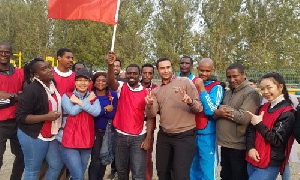After living in Ghana since birth, my desire for a new location and experience in pursuit of a PhD increased. As the search intensified, the rapid expansion of China’s economy in addition to recent strategic partnerships with Africa were critical considerations in my deciding to settle down in the world’s second largest economy.
Furthermore, China’s target of attracting 500,000 foreign students by 2020 also influenced my decision. According to data, the number of foreign students has risen from 141,087 to 442,431 in 11 years and are estimated to rise at an average annual rate of 13 percent, making it the third most popular study destination globally.
Despite the impressive statistics on China, I was anxious because of perceptions formed through media reports. Ghana’s “Galamsey” menace is a typical example of this. “Galamsey,” a local Ghanaian term denoting illegal small-scale artisanal gold mining was on the rise until the present government with support of media and civil society groups launched a campaign to end it.
Amongst others, this activity pollutes water bodies and degrades the environment. Unfortunately, some Chinese nationals in Ghana are known to be culprits with some of them arrested in the past 18 months, according to reports. Despite the efforts of Chinese Missions to correct such perceptions, the image lingers.
On board ET 920 from Accra to Addis Ababa, a kind act of a Chinese national while disembarking from the plane in Addis Ababa set the pace for my experience in China. As I tried to join the queue of passengers getting off the aircraft, travelers in a rush wouldn’t allow me to. In order to avoid the scrum, I decided to wait for most passengers to leave.
Warm moment
I felt a tap on my shoulder and when I turned a man smiled at me and said in a Chinese accent, “Come on, join, let’s go” amid hollering from passengers in the rear. We spoke briefly and our conversation revealed that he was an alumnus of my school — the University of International Business and Economics (UIBE) in Beijing. We exchanged contacts and separated. This was my first impression and “tip of the iceberg” encounter with Chen Buchao with the English pseudonym, Alex.
After passing through immigration at Beijing Capital International Airport, I headed straight to the baggage carousel. I had been told that representatives of UIBE’s International Students Union would be at the airport to receive me with a free ride to campus.
Unfortunately, the luggage which contained my clothes was not on the carousel. I had read about how frustrating it could be when a traveler loses baggage, but underestimated it until I experienced it. Confused, I waited and kept checking the carousel for hours. With only four bags left, I went to the baggage complaint section to report the loss.
I exited the terminal four hours after the plane’s arrival and didn’t find the team. Probably they assumed I had found my way to the campus. I reached out to Chen who directed me to the airport taxi section after I insisted that he assist remotely because he wanted to return to the airport and help me personally.
After waiting in the queue for over an hour, it was my turn to board the next taxi. As I put my bag in the trunk, a noise was heard. The driver immediately pointed to a plastic covering and started yelling, saying I had broken it. I called the airport security officers for assistance and challenged the driver’s claim, adding that even if the insignificant damage was caused by me, I wasn’t ready to pay. There were arguments and he angrily drove off. I got another taxi and called Chen to assist with directions.
At the school, Chen was on phone with me and asked students who could speak English to assist me to the international hostel. I settled in my room at about 2 am, exhausted and thankful.
Chen visited me on campus in the afternoon because he knew I had lost my luggage. He brought me a box of moon cakes for the Mid-Autumn Festival and invited me to dinner with his wife a week later.
I am sharing this story because I believe there are many good Chinese citizens who will go the extra mile to help a stranger. It is unfortunate that the negatives usually strike the public eye.
Considering China’s global economic dominance, Chinese citizens must complement it by being national ambassadors wherever they are. As the popular saying goes, “if you don’t tell your story, someone else will and you may not like it.”
The writer is an International post graduate student at the University of International Business and Economics.
Diaspora News of Tuesday, 20 November 2018
Source: kasapafmonline.com













